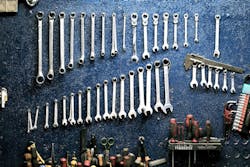Tesla May Have Churned Out High Volume of Flawed Parts
March 16, 2018—Several current and former Tesla employees say the automaker is manufacturing a high ratio of flawed parts and vehicles, according to CNBC.
One current Tesla engineer estimated that 40 percent of the parts made or received at its factory in Fremont, Calif., require rework. The need for reviews of parts coming off the line and the rework has contributed to Model 3 delays, the engineer said, according to CNBC.
Another current employee from Tesla's Fremont factory said the company's defect rate is so high that it's hard to hit production targets.
To deal with a backlog of flawed parts and vehicles, said these current and former employees, Tesla has brought in teams of technicians and engineers from its service centers and remanufacturing lines to help with rework and repairs on site in Fremont.
They also said that sometimes the luxury EV maker has taken the unusual measure of sending flawed or damaged parts from Fremont to its remanufacturing facility in Lathrop, Calif., about 50 miles away, instead of fixing those parts "in-line."
The current and former employees declined to be named because they are not authorized to talk to the press.
Tesla flatly denies that its remanufacturing teams engage in rework. "Our remanufacturing team does not 'rework' cars," a spokesperson said. The company said the employees might be conflating rework and remanufacturing. It also said every vehicle is subjected to rigorous quality control involving more than 500 inspections and tests, according to CNBC.
Lean manufacturing specialist Matt Girvan, founder of MAG Consulting, said: "Even during what is considered 'launch' mode, if a company is selling its cars to customers, it should not be experiencing large amounts of rework. This speaks to an internal quality issue that is on a magnitude that is not normal for most car manufacturers."
Tesla said that cars coming off the end of the line are reviewed in detail in an effort to "produce perfect cars for every customer." It said that most calibrations made at the end-of-line inspection are minor and resolved in minutes. Tesla also said that the efficiency of production has improved significantly: "Whereas before it took three shifts with considerable overtime to produce our target annual production of 100,000 Model S and X vehicles, now it can be done with only two shifts and minimal overtime."
